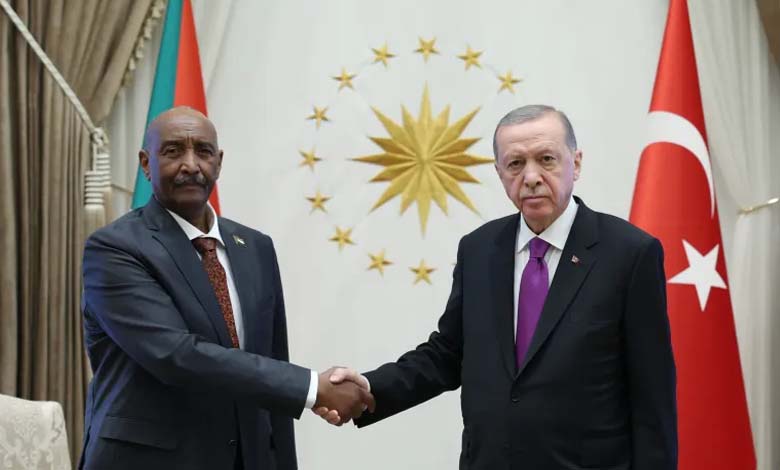Secret Visit by al-Burhan to Turkey Raises Suspicions About the Return of the Muslim Brotherhood to Sudanese Politics

Attempts to Reintroduce the Muslim Brotherhood Through Ankara – Investment Promises in Exchange for Turkish Support: A Suspicious Deal in the Making
-
The gold alliance between Sudan and Turkey: Political and Economic Exchange
-
Al-Burhan Meets Leaders in Turkey: Are the Muslim Brotherhood Returning to the Forefront in Sudan?
In a move that has raised many questions, informed sources revealed that Abdel Fattah al-Burhan, Chairman of Sudan’s Transitional Sovereignty Council, conducted a secret visit to Turkey on March 30, 2025, where he joined his family in celebrating Eid al-Fitr. Although the visit was officially described as personal and family-related, behind-the-scenes developments suggest deeper political motives. Al-Burhan reportedly met with key figures from the former Sudanese regime currently residing in Turkey, including prominent members of the Muslim Brotherhood.
This visit precedes his expected participation in the International Economic Conference set to take place in Antalya on April 15, 2025, giving it additional political weight, particularly in light of increasing regional and international engagement concerning the Sudanese crisis.
-
Secret Visit by al-Burhan to Turkey Raises Suspicions About the Return of the Muslim Brotherhood to Sudanese Politics
-
Unannounced Visit by Al-Burhan to Turkey Raises Questions about the Return of Islamists
Meetings with Former Regime Figures
Sources familiar with the Sudanese file revealed that al-Burhan used his time in Turkey to hold closed-door meetings with former regime leaders who fled after the fall of Omar al-Bashir in 2019. These meetings focused on reorganizing the political Islamist faction—specifically the Muslim Brotherhood—in preparation for their return to Sudan and participation in any upcoming political settlement.
The sources indicated that al-Burhan aims to build a strategic relationship with these figures to secure political and popular backing, which he currently lacks within Sudan, especially amid his declining popularity and eroding military support from certain units. He also seeks to restore a power balance in light of the growing influence of the Rapid Support Forces on the ground.
-
Al-Burhan’s Visit to Turkey: Secret Deals or Political Arrangements?
-
Al-Burhan’s Visit to Turkey: Could It Bring Islamists Back into Sudan’s Political Scene?
Investment Promises in Exchange for Turkish Support
Diplomatic reports revealed that al-Burhan proposed joint investment projects in agriculture, infrastructure, and energy to the Turkish government, in exchange for facilitating the activities of Brotherhood members residing in Turkey and securing their open support for a new political roadmap under development—one that would reintegrate them into Sudan’s state structures.
This move is seen as a transparent attempt to buy political influence through economic incentives, contradicting official claims that Sudan is on a path toward a transparent democratic transition. Al-Burhan appears to be redrawing Sudan’s political map through Turkey, using his military authority as a shield to enforce a new reality that may bring the country back under authoritarian rule.
Analysts warn that this direction poses a serious threat to peace and stability, given the widespread public rejection of the Muslim Brotherhood due to their historical record of repression, exclusion, and the dismantling of state institutions.
-
Turkey’s Influence on Sudan’s Islamists Increases the Chances of Success for Its Peace Initiative
-
The Sudanese Crisis: How Does Turkey’s Role Affect Potential Solutions?
Warnings of a Potential Political Setback
Al-Burhan’s maneuvers open the door to a potential political setback in Sudan, especially amid ongoing field escalations, the war between the army and the Rapid Support Forces, and the worsening humanitarian and economic conditions across the country. Any attempt to restore former regime symbols through external deals will likely face strong resistance from revolutionary forces and civil society, potentially reigniting nationwide unrest.
Observers believe that al-Burhan’s visit to Turkey is not merely personal, but rather part of a broader project aimed at reengineering political power in Sudan—ensuring his continued hold on power by aligning with a group historically associated with failure, corruption, and authoritarianism.












